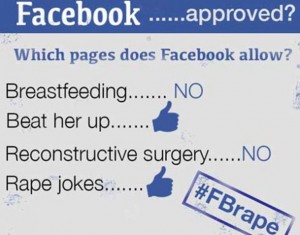Feminists Take on Facebook
For years, Facebook has had an aggressive policy about hate speech, nudity and other kinds of content deemed offensive. One exception to this rule? Rampant rape humor, including threats, was treated as “free speech” by the social media behemoth – or taken down only to be reinstated by offenders. We’re talking pages like “Kicking Sluts in the Uterus” and, most disturbingly, images of battered and assaulted women.
All that changed this week when a concerted campaign by a number of feminist groups including Women, Action and the Media (of which I’m a member), Everyday Sexism, and writer Soraya Chemaly, targeted Facebook’s advertisers with tens of thousands of tweets and thousands of emails, causing an advertisers’ exodus. The campaign intentionally echoed previous, more spontaneous feminist campaigns against Susan G. Komen for dropping Planned Parenthood and Rush Limbaugh for his treatment of Sandra Fluke.
The action the #FBRape activists demanded from Facebook wasn’t that it limit its allowed speech, but rather that it apply an already in-place policy more fairly. And this had important implications: that we must extend our understanding of bigotry and hate speech to include vile – and on the internet, ever-present – strains of misogyny.
As Chemaly recently told the Washington Post, “What we were asking Facebook to do isn’t to curtail its speech further. It’s to apply its policies equally to men and women.”
The barrage of responses got results. Big time. Facebook agreed to reevalute its policy, saying in a statement:
In recent days, it has become clear that our systems to identify and remove hate speech have failed to work as effectively as we would like, particularly around issues of gender-based hate. In some cases, content is not being removed as quickly as we want. In other cases, content that should be removed has not been or has been evaluated using outdated criteria…We need to do better – and we will.”
After the change from Facebook even the New York Times editorial board weighed in, praising activists and saying Facebook should have responded earlier. As WAM’s executive director, Jaclyn Friedman, put it: “There’s a critical mass right now; it could be a tipping point moment.”
It’s an exciting moment for online activism, particularly of the feminist variety. Jessica Valenti wrote in the Nation that the internet has been like a glass showcase of the worst strains of sexism - -making it glaringly obvious to all but the deluded. At the same time, the medium it also creates a direct way to push back.
But today, telling women that sexism doesn’t exist anymore is a really hard sell. Thanks to the Internet and the speed at which stories move—not to mention the vile sexism in most online spaces—any American woman who spends more than five minutes onlines hears about or experiences misogyny every day.
Thanks to the #FBRape campaign, that experience of misogyny just got dealt a major setback.
Sarah Marian Seltzer is a journalist and fiction writer based in New York City. Her work has appeared in Ms. Magazine, the Washington Post, the Hairpin and the Forward, among other places. Find her at www.sarahmseltzer.com and tweeting too much at @sarahmseltzer.
![[the current issue of ZEEK]](../../image/2/100/0/5/uploads/leftistethicistgraphic-52842c6a.png)
- 5000 Pages of Zeek
- Founded in 2001, Zeek was the first Jewish online magazine, and we have over 5000 pages online to prove it, all available free of charge. Read more in the Archive.
More articles by
- We're on Hiatus!
- Euphoria, Curiosity, Exile & the Ongoing Journey of a Hasidic Rebel: A Q & A with Shulem Deen
- Purim’s Power: Despite the Consequences –The Jewish Push for LGBT Rights, Part 3
- Love Sustains: How My Everyday Practices Make My Everyday Activism Possible
- Poet Q, Poet A: Jews Are Funny! Six Poets on Jewish Humor, Poetry & Activism and Survival
More articles in


